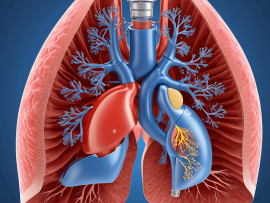Abstract BACKGROUND: Major bleeding after cardiac surgery is still a relatively common complication, requiring red blood cell (RBC) transfusions and use of procoagulants. The existing guidelines recommend a bleeding management..
Read MoreAbstract Background Maintaining adequate oxygen delivery during cardiopulmonary bypass (CPB)-assisted cardiac surgery is crucial, but hyperoxia has been suggested to cause organ injury. We compared the effects of restrictive vs liberal oxygenation..
Read MoreAbstract Decisions regarding veno-venous extracorporeal membrane oxygenation (vv-ECMO) in patients with acute respiratory distress syndrome (ARDS) are often based solely on clinical and physiological parameters, which may insufficiently reflect severity..
Read MoreAbstract The demand for homologous blood transfusions has reached an unprecedented level, driven by a declining donor population and the ever-increasing need for blood products. While significant advancements have been..
Read MoreAbstract Objectives: To evaluate the relationship between the duration of pre-extracorporeal membrane oxygenation (ECMO) mechanical ventilation and mortality in acute respiratory distress syndrome (ARDS) patients undergoing venovenous ECMO. Design: Retrospective..
Read MoreAbstract Purpose Oxygen delivery (DO2) during cardiopulmonary bypass (CPB) is critical in preventing postoperative complications in adult cardiac surgery. This systematic review aimed to assess the relationship between intraoperative DO2 during..
Read MoreAbstract Cardiac surgery, particularly procedures involving cardiopulmonary bypass (CPB), is associated with a high risk of postoperative complications, including systemic inflammatory response syndrome (SIRS), postoperative atrial fibrillation (POAF), and infection...
Read MoreAbstract The 2025 European Resuscitation Council (ERC) Guidelines present the most up-to-date evidence-based guidelines for the practice of resuscitation across Europe. The ERC Guidelines 2025 are based on evidence produced..
Read MoreAbstract Objective To evaluate the robustness of randomized controlled trials (RCTs) investigating acute normovolemic hemodilution (ANH), a blood conservation strategy designed to reduce transfusion requirements, in cardiac surgery using the..
Read MoreAbstract Perioperative hyperglycemia is associated with increased morbidity and mortality. We report the findings of our quality improvement project on the use of an electronic insulin dosing calculator (EIC) to..
Read MoreAbstract Extracorporeal membrane oxygenation (ECMO) supports patients with severe refractory cardiac or respiratory failure but managing residual circuit blood after weaning lacks consensus. After decannulation, the oxygenator and circuit retain..
Read MoreAbstract Introduction Limb loss after combat injury is a major factor for morbidity in combat casualties. Although tourniquets clearly save lives, they can result in prolonged ischemia in large scale..
Read MoreAbstract In humans, the transfer of respiratory gases between the atmosphere and living cells depends on their diffusion between lungs, blood, and cells, as well as their advective transport by..
Read MoreAbstract Background The optimal cerebral protection strategy during complex aortic surgery remains controversial, and various brain monitoring modalities are used to provide different information to improve cerebral protection. This study..
Read MoreAbstract Extracorporeal cardiopulmonary resuscitation (ECPR) has evolved into a life-saving therapy for select cardiac arrest patients, yet a growing body of evidence suggests it also holds promise as a bridge..
Read MoreAbstract Purpose of review This review addresses the growing concern over nosocomial infections in patients undergoing extracorporeal membrane oxygenation (ECMO) and/or continuous renal replacement therapy (CRRT). As the use of..
Read MoreAbstract Introduction Postoperative delirium affects up to 60% of cardiac surgical patients. No reliable gold standard method exists for preventing delirium after cardiac surgery. An example of patient-personal monitoring is..
Read MoreAbstract Preventing coagulation during extracorporeal blood circulation is critical for clinical treatments. Developing anticoagulant materials for key components can reduce reliance on systemic anticoagulants and improve safety. However, such materials..
Read MoreAbstract Juvenile nasopharyngeal angiofibroma (JNA) is a rare, highly vascular benign tumor that predominantly affects adolescent males. Despite its benign histology, JNA may exhibit aggressive behavior, often invading adjacent anatomic..
Read MoreAbstract IMPORTANCE: Physical therapy (PT) interventions for patients supported with extracorporeal membrane oxygenation (ECMO) is thought to help preserve independence, but the impact of PT frequency on ECMO recovery is..
Read MoreAbstract Context Use of palliative care in extracorporeal life support (ECLS) has increased, but its impact on patient- and family-centered outcomes remains unclear. Objective To examine the relationship between specialty..
Read MoreAbstract Background The bleeding in cardiac surgery remains a significant clinical problem. There is no “gold standard” method to quantify blood loss. Traditional measurement of drainage volume often underestimates or..
Read MoreAbstract Background Despite the widespread adoption of selective antegrade cerebral perfusion (SACP) for neonatal aortic arch reconstruction, significant variability in techniques persists across institutions, thus reflecting limited supporting data and..
Read MoreAbstract Objectives The aim of the study was to evaluate the effect of autologous blood transfusion on the requirement of allogeneic blood products and the change in hemoglobin levels in..
Read MoreAbstract Therapeutic plasma exchange (TPE) in pediatric patients presents many challenges, including management of a large extracorporeal volume (ECV) and calcium replacement for patients who may not be able to..
Read MoreAbstract Delays in mechanical circulatory support initiation, in particular extracorporeal membrane oxygenation (ECMO), can exceed an hour while awaiting a specialized shock team. Delays can negatively impact patient outcomes. To address..
Read MoreAbstract Background The experience of a percutaneous microaxial (Impella) in children with is limited. The primary objective of this study was to review our institutional clinical outcomes of Impella use in children..
Read MoreAbstract CARDIOPULMONARY BYPASS (CPB) is an essential component of cardiac surgery, and its unexpected failure during surgery can compromise circulatory and respiratory management, potentially endangering the patient's life. In the..
Read MoreAbstract Objective This study aims to investigate pulmonary protective and antiinflammatory effects of dexmedetomidine (DEX) in patients undergoing cardiac surgery with cardiopulmonary bypass (CPB) by meta-analysis. Methods Six databases were..
Read MoreAbstract Purpose To summarize the currently available evidence regarding the effectiveness and safety of extracorporeal membrane oxygenation (ECMO) cannulation performed by intensivists. Methods We conducted a systematic search of MEDLINE,..
Read More


















